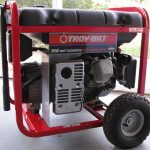Power outages may have been a fun time as a kid but as an adult they can create serious stress. Is our food going to spoil? How will we keep the house warm? What if this power outage lasts longer then a few hours? For many, an emergency generator could be your saving grace. A generator will allow you to run lights, heat, and keep your refrigerator and freezer running while your power is out. While they can be a great convenience, there are some generator safety tips you need to know.
Safety First
 Do not run gasoline engines in an enclosed area. They produce carbon monoxide, a dangerous gas that can cause death.
Do not run gasoline engines in an enclosed area. They produce carbon monoxide, a dangerous gas that can cause death.- Check the oil level in the engine on a regular basis, especially before using.
- Before refueling, let the engine cool completely.
- Place your generator a safe distance away from other structures. The engine can become quite hot and could be a fire hazard.
- Make sure that your generator stays dry to prevent water damage and a potential electrical hazard.
- Do not use a generator with appliances that have gotten wet.
- Watch out for a voltage drop when using an extension cord that is too long or when using a cord with a wire size that is too small.
- Connect generators directly into appliances but never directly into a home electrical supply box.
- Ground the generator based on manufacturers’ instructions.
- Select the appropriate outlet with the correct voltage.
- Start running the generator before turning on the AC circuit or before plugging in the appliance.
Did You Know?
The capacity of a generator is calculated in watts. For instance, you may own a 2,000-watt generator. Therefor, if you have an appliance that requires 120 volts and uses 10 amps, the appliance will require 1,200 watts of power. By doing this calculation, you can determine what appliances can safely run on your generator.
Power outages can be less stressful by keeping your family warm and safe by using the above generator safety tips.
Did you find these generator safety tips helpful? Please share our blog post with others.